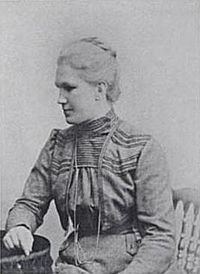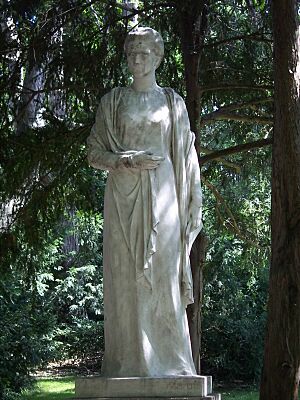Auguste Fickert facts for kids
Quick facts for kids
Auguste Fickert
|
|
|---|---|

Auguste Fickert, pre 1905
|
|
| Born | 25 May 1855 Vienna, Austria
|
| Died | 9 June 1910 (aged 55) Maria Enzersdorf, Austria
|
| Nationality | Austrian, (Austro-Hungarian Empire) |
| Other names | "Gusti" |
| Occupation | Teacher |
| Known for | Feminist activism |
Auguste Fickert was an important Austrian woman who fought for women's rights and social fairness. She was born on May 25, 1855, in Vienna, Austria, and passed away on June 9, 1910, in Maria Enzersdorf, Austria. She was a teacher and worked hard to improve the lives of working-class women, especially in education and legal protection.
Contents
Her Early Life and Education
Auguste Fickert grew up in Vienna. Her father, Wilhelm Fickert, was a printer for the court. She had a sister, Marianne, and two brothers, Emil and Willy.
From 1869, Auguste went to a convent school called Englisher Fraulein. Later, she attended a teacher training college, the Lehrerinnen-Bildungsanstalt St Anna. She graduated with honors in 1876.
Auguste Fickert as a Teacher
In 1876, Auguste started teaching at a girls' school in Vienna. She remained a teacher throughout her entire career.
In 1893, she left the Catholic Church. She openly spoke out against the strong religious teaching in Austrian schools at that time. Because of this, she faced harsh criticism from a political group called the Christian Social Party. This criticism continued for the rest of her life.
Fighting for Women's Rights
Auguste Fickert's first public political action was in 1889. She organized a petition to protest against women losing their right to vote in local elections in Lower Austria. Women had been able to vote since 1862, but a new law took this right away.
Auguste collected over 1,000 signatures from women who were upset about losing their voting rights. Even though the petition didn't stop the law, it marked the beginning of her work to gain voting rights for all women in Austria. She also worked to help women who were civil servants form unions.
Founding Women's Organizations
In 1893, Auguste Fickert helped start the Allgemeiner Österreichischer Frauenverein (General Austrian Women's Association). This group worked to make life better for working-class women. It was known as the most forward-thinking feminist group in Austria at that time.
Auguste was the editor of the association's publications, Dokumente der Frauen (Documents of Women) and Neues Frauenleben (New Woman's Life). In 1897, she became the director of the organization.
She worked closely with her friend Marie Lang. However, they had a disagreement, and Auguste gave up her roles at the papers to Marie. Auguste was known for being very determined, which sometimes made it hard for her to work with others. Even so, she remained a very inspiring figure for the women's movement in Austria.
In 1902, Auguste Fickert started a new magazine, also called Neues Frauenleben. She chose Leopoldine Kulka to be its editor. Leopoldine Kulka was a historian and the first woman lecturer at the University of Vienna.
Personal Life and Later Years
Auguste Fickert had a close friend named Ida Baumann, who was also a teacher. Ida supported Auguste's early political actions and stayed close to her throughout her life. Ida preferred to stay out of the public eye.
Towards the end of her life, Auguste was involved with the Einküchenhaus (one-kitchen house). This was a special housing cooperative designed for professional women.
Auguste Fickert passed away on June 9, 1910, at the age of 55. She died in a sanatorium in Maria Enzersdorf, Lower Austria, due to organ failure. She is buried in the Neustift am Walde cemetery in Vienna.
Honors and Legacy
In 1929, a sculptor named Franz Seifert created a memorial statue for Auguste Fickert. This statue is now located in the Türkenschanzpark in Währing, Vienna. The statue has an inscription that says: "Full of courage and energy she sacrificed her life to high ideals."
In 1926, a street in Vienna was named after her, called Fickertgasse.


